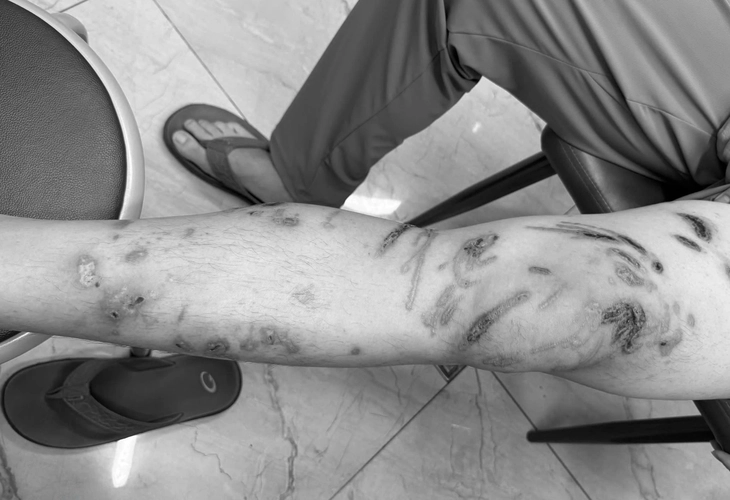
Doctor Thanh examines a patient - Photo: BSCC
Burning sensation on entire left leg after 15 minutes of swimming in the sea
Recently, Mr. H. (42 years old, living in Hanoi) and a group of friends went swimming in the sea during an early summer trip . However, after only about 10 minutes of swimming, he suddenly felt a sharp pain in his leg. A few minutes later, the burning, itchy feeling gradually spread, forcing him to return to shore immediately, seeing a jellyfish clinging tightly to his left leg, which he had to remove with great difficulty.
Thinking that it was just a mild irritation and not dangerous, Mr. H. did nothing but take a bath with fresh water. However, a few hours later, his legs began to develop a red rash and burning sensation.
However, instead of going to the doctor, he thought that the simple injury would heal on its own, partly because of his business trip schedule, so he bought medicine at the counter. After nearly half a month, the injury did not improve but became more severe, so he decided to see a doctor.
Directly examining Mr. H., Dr. Nguyen Tien Thanh - a member of the Vietnam Dermatology Association - said that the patient came in with infected contact dermatitis and had hypertrophic scars caused by jellyfish.
On the skin there are red, swollen, string-shaped bumps, blisters, pus blisters and widespread burning pain. This is a common symptom when the toxin from jellyfish tentacles directly affects the skin.
According to Dr. Thanh, jellyfish tentacles contain nematocysts, which when in contact with the skin will release toxins such as proteins, histamine, serotonin and inflammatory enzymes - strongly irritating the skin, causing burning, swelling or blistering.
Just a short exposure will cause the stung skin to react violently. Some cases may have hives all over the body, difficulty breathing, and low blood pressure - signs of anaphylactic shock requiring immediate hospitalization.
"The patient had a local reaction, but if treated incorrectly, the damage could spread and leave permanent dark scars and hypertrophic scars. The doctor said it would take several months for the skin to fully recover from the scars caused by the jellyfish.
Unfortunately, if the patient had gone to the doctor sooner, the treatment would have been more effective and left fewer sequelae," Dr. Thanh shared.

The patient's legs are covered with scars and infections - Photo: BSCC
Correct treatment when stung by jellyfish
One of the common mistakes that many people make when stung by a jellyfish is to wash the wound with fresh water, rub it or use ice. According to Dr. Thanh, this is absolutely not recommended, because it will cause the venomous cysts on the skin to burst, releasing more venom and making the injury worse.
The correct treatment in this case is to stay calm, do not scratch or rub hard. You can gently wash the skin with clean sea water if nothing else is available.
If available, white vinegar (acetic acid) is considered a safe option to inactivate toxins from some common jellyfish species. After first aid at the scene, the patient should quickly go to the nearest medical facility to have the extent of the injury assessed and timely treatment.
Dr. Thanh warns that to avoid jellyfish stings, you should carefully observe the sea before entering the water. Avoid swimming when the water is foamy, has strange colored streaks, or sees many small creatures floating. If possible, wear a long-sleeved swimsuit and swim close to shore.
After swimming in the sea, you should shower with clean water as soon as possible to remove salt residue and attached organisms.
If you are unfortunately stung by a jellyfish, remember three basic principles: do not rub, do not wash with fresh water, and do not be subjective.
In case you cannot get to a medical facility immediately, you can wash the wound with clean sea water, use white vinegar if available and apply cold compresses to reduce swelling. If you see large blisters on the skin, widespread itching, difficulty breathing or dizziness, you need to go to the hospital immediately for timely intervention.
Source: https://tuoitre.vn/boi-nhiem-seo-phi-dai-vi-bi-sua-bam-khi-dang-tam-bien-20250529082541.htm




































































































Comment (0)